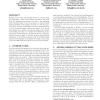Free Online Productivity Tools
i2Speak
i2Symbol
i2OCR
iTex2Img
iWeb2Print
iWeb2Shot
i2Type
iPdf2Split
iPdf2Merge
i2Bopomofo
i2Arabic
i2Style
i2Image
i2PDF
iLatex2Rtf
Sci2ools
MSR
2006
ACM
2006
ACM
Mining eclipse for cross-cutting concerns
Software may contain functionality that does not align with its architecture. Such cross-cutting concerns do not exist from the beginning but emerge over time. By analysing where developers add code to a program, our history-based mining identifies cross-cutting concerns in a two-step process. First, we mine CVS archives for sets of methods where a call to a specific single method was added. In a second step, simple cross-cutting concerns are combined to complex cross-cutting concerns. To compute these efficiently, we apply formal concept analysis—an algebraic theory. Unlike approaches based on static or dynamic analysis, history-based mining for cross-cutting concerns scales to industrial-sized projects: For example, we identified a locking concern that cross-cuts 1284 methods in the open-source project Eclipse.
Cross-cutting Concerns | Identifies Cross-cutting Concerns | MSR 2006 | Such Cross-cutting Concerns |
| Added | 14 Jun 2010 |
| Updated | 14 Jun 2010 |
| Type | Conference |
| Year | 2006 |
| Where | MSR |
| Authors | Silvia Breu, Thomas Zimmermann, Christian Lindig |
Comments (0)

